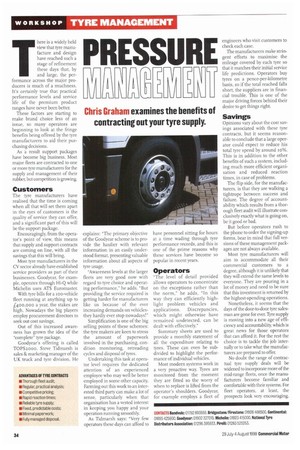PRESSU
Page 36

If you've noticed an error in this article please click here to report it so we can fix it.
Chris Graham examines the benefits of contracting out your tyre supply.
here is a widely held view that tyre manufacture and design have reached such a stage of refinement these days that, by and large, the per formance across the major producers is much of a muchness. It's certainly true that practical performance levels and service life of the premium product ranges have never been better.
These factors are starting to make brand choice less of an issue, so many operators are beginning to look at the fringe benefits being offered by the tyre manufacturers to aid their purchasing decisions.
As a result support packages have become big business. Most major fleets are contracted to one or more tyre manufacturers for the supply and management of their rubber, but competition is growing.
Customers
The tyre manufacturers have realised that the time is coming when all that will set them apart in the eyes of customers is the quality of service they can offer, and a significant part of this will be the support package.
Encouragingly, from the operator's point of view, this means that supply and support contracts are coming on line, with all the savings that this will bring.
Most tyre manufacturers in the CV sector already have established service providers as part of their businesses. Goodyear, for example, operates through Hi-Q while Michelin uses ATS Euromaster.
With tyre bills for a too-vehicle fleet running at anything up to £400,000 a year, the stakes are high. Nowadays the big players employ procurement directors to seek out cost savings.
Out of this increased awareness has grown the idea of the "complete" tyre package.
Goodyear's offering is called TO PS2000. Steve Tidmarsh is sales & marketing manager of the UK truck and tyre division. He explains: "The primary objective of the Goodyear scheme is to provide the haulier with relevant information in an easily understood format, presenting valuable information about all aspects of Lyre usage.
"Awareness levels at the larger fleets are very good now with regard to tyre choice and operating performance," he adds. "But providing the service required is getting harder for manufacturers like us because of the ever increasing demands on vehiclesthey hardly ever stop nowadays!"
Simplification is one of the big selling points of these schemes: the tyre makers are keen to stress the amount of paperwork involved in the purchasing, condition monitoring, retreading cycles and disposal of tyres.
Undertaking this task at operator level requires the dedicated attention of an experienced employee who may well be better employed in some other capacity. Farming out this work to an interested third party can make a lot of sense, particularly when that organisation has a vested interest in keeping you happy and your operation running smoothly.
As Tidmarsh says: "Very few operators these days can afford to have personnel sitting for hours at a time wading through tyre performance records, and this is one of the prime reasons why these services have become so popular in recent years.
Operators
"The level of detail provided allows operators to concentrate on the exceptions rather than the norm," he adds, "In this way they can efficiently highlight problem vehicles and applications. Discrepancies, which might otherwise have remained undetected, can be dealt with effectively."
Summary sheets are used to provide a monthly statement of all the expenditure relating to tyres. These can even be subdivided to highlight the performance of individual vehicles.
Most modern systems work in a very proactive way. Tyres are monitored from the moment they are fitted so the worry of when to replace is lifted from the operator's shoulders. Goodyear, for example employs a fleet of
engineers who visit customers to check each case.
The manufacturers make stringent efforts to maximise the mileage covered by each tyre so that it matches their initial service life predictions. Operators buy tyres on a pence-per-kilometre basis, so if the total reached falls short, the suppliers are in financial trouble. This is one of the major driving forces behind their desire to get things right.
Savings
Opinions vary about the cost savings associated with these tyre contracts, but it seems reasonable to condude that a large operator could expect to reduce his total tyre spend by around to%. This is in addition to the other benefits of such a system, including much more efficient organisation and reduced reaction times, in case of problems.
The flip side, for the manufacturers, is that they are walking a tightrope between success and failure. The degree of accountability which results from a thorough fleet audit will illustrate conclusively exactly what is going on, be it good or bad.
But before operators rush to the phone to order the signing-up forms, bear in mind that full versions of these management packages are not always available.
Most tyre manufacturers will aim to accommodate all their commercial customers to a degree, although it is unlikely that they will extend the same levels to everyone. They are pouring in a lot of money and need to be sure that this investment is returned by the highest-spending operations.
Nonetheless, it seems that the days of the door-to-door tyre salesman are gone for ever. Tyre supply is moving into a new age of efficiency and accountability, which is great news for those operators that can afford it. For the rest the choice is to tackle the job internally or to take what the manufacturers are prepared to offer.
No doubt the range of contractual tyre supply deals will be widened to incorporate more of the mid-range fleets, once the manufacturers become familiar and comfortable with their systems. For fleet operators, at least, the prospects look very encouraging.












































































































